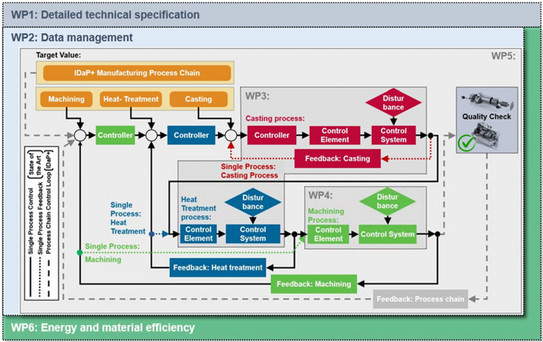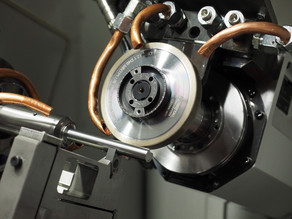Cornet Fördert das Projekt "Integrated Data-based Process Chain Optimisation in Casting and Machining Production - IDaP+"
- News
- Förderung
- Top
Das Projekt "IDaP+" zielt auf eine ganzheitliche Prozesskettensteuerung für die Herstellung von Leichtmetallgussprodukten mit anschließender Wärmebehandlung und Bearbeitung. Diese Prozessketten sind insbesondere für die Produktion von elektrischen Antrieben in der Automobilindustrie, aber auch in anderen Branchen relevant. An diesen Prozessketten sind verschiedene Unterlieferanten und überwiegend Klein- und mittlere Unternehmen (KMU) beteiligt, z.B. durch die Herstellung von Gussformen und die Durchführung von Gießprozessen, durch die Bereitstellung von Wärmebehandlung, durch die Durchführung von Bearbeitungsprozessen als Lohnfertiger oder durch die Bereitstellung von Werkzeugen, Maschinen, Anlagen, Software und Dienstleistungen.

The main objective of the project is to investigate the use of production information from distributed and heterogeneous data acquisition to data processing and data feedback in order to allow for a process chain optimization with respect to efficiency, quality and resilience. By comprehensive linking of sensor and control information from all relevant process steps as well as analytic and data‐based models in terms of soft sensor technology, a digital representation is established. Intelligent process chain control methods are researched in order to derive specific process improvements continuously along the value‐chain. Each SME involved in the entire value‐creation benefits from dedicated process chain control information provided by the system. A distributed but connected data processing structure according to the GAIA‐X framework enables secure information handling but process chain control interaction in appropriate time. Based on the linked interpretation of the heterogeneous process and quality information of the production chain, cascaded control loops are established to adjust all relevant process steps with regard to the desired characteristics of the finished components. Thus, the quality creation process will be monitored and traced comprehensively in order to achieve drastically shortened ramp‐up‐times, optimised product performance and prevention of defective parts. The project in particular aims in a drastic reduction of material and energy consumption.
The IDaP+ project will provide fundamental insights, detailed understanding and the technological background for a knowledge based and effective implementation of innovative digitization systems and process improvements in the casting‐machining process chain. This will not only benefit the casting and machine tool sectors, but also downstream users, such as the mobility sector, the energy sector and all other industrial sectors where thin walled cast components are deployed. This in particular contributes to the current transformation from internal combustion engine vehicles (ICEV) to electric vehicles. Therefore, exhibiting exemplary and challenging requirements regarding accuracy, weight and durability, electric motor housings, scroll compressor parts as well as battery housings constitute the application related focus of the IDaP+ project. The here involved research institutes are particularly qualified to solve this complex and interdisciplinary research challenge. For each process step and relevant technology within the casting‐machining process chain, an experienced research partner with specific knowhow participates in the IDaP+ project. All scientific partners provide substantiated previous knowledge with respect to sensor integration and signal processing, data assessment and interpretation, process monitoring and control as well as quality related evaluation of process states and manufactured parts. The participating companies in the User Committee represent all relevant process steps as well as digitalisation providers and are of all sizes from SMEs to OEMS, which shows the relevance to the industry. The broad knowledge and scientific and industrial experience in production processes will boost the project to achieve results that are not possible for single research institutes or companies.




